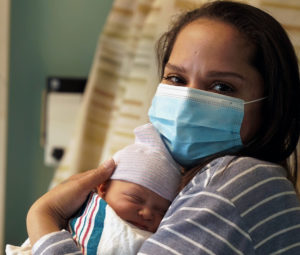
Treating mild chronic hypertension with medications during pregnancy is beneficial and safe for mother and baby, according to the results of a study co-authored by Matthew Hoffman, M.D., the Marie E. Pinizzotto, M.D., Endowed Chair of Obstetrics and Gynecology at ChristianaCare. This pivotal study, published this month in The New England Journal of Medicine, has the potential to change the standard of care for some pregnant women.
It represents the first time that comprehensive, evidence-based data show the benefits in treating mild forms of chronic hypertension during pregnancy.
The results of the study derive from the Chronic Hypertension and Pregnancy (CHAP) consortium, which comprises about 60 clinical sites from across the United States. ChristianaCare’s Center for Women’s & Children’s Health participated in the study, which was led by the University of Alabama at Birmingham.
“Mild hypertension in pregnant women is a common condition that we have long known puts a pregnancy at risk for pre-term birth and preeclampsia, a leading cause of maternal mortality,” said Dr. Hoffman, who serves in a number of national capacities on obstetrical issues.
“As the best treatment had not been clearly defined, we and our collaborators saw the opportunity to explore whether blood pressure medications would improve pregnancy outcomes without compromising a baby’s growth and overall health.
The results of the study show that certain medications in pregnant women with mild hypertension substantially decreased the risk of preeclampsia and preterm birth.
“The results of the study show the success of using these medications in pregnant women with mild hypertension substantially decreased the risk of preeclampsia and preterm birth. We believe that this study will serve as the basis of updating practice guidelines nationwide, and it should improve the health of new mothers in the future.”
Treating chronic hypertension
Chronic hypertension, also known as high blood pressure, affects more than 2% of pregnant women in the United States. It increases the risk for pregnancy complications, including maternal and perinatal death, and is associated with a three- to five-times increased risk for a number of serious conditions. These include preeclampsia, placental abruption, preterm birth, small-for-gestational age newborns and perinatal death. Chronic hypertension also is associated with a five- to 10-times increased risk for maternal death, heart failure, stroke, pulmonary edema and acute kidney injury.
More than 2,400 pregnant women – including 48 at ChristianaCare’s Center for Women’s & Children’s Health – were enrolled in the study between September 2015 and March 2021.
Participants were randomized into two groups – active and standard. To keep blood pressure below 140/90 mmHg, the active group was prescribed blood pressure medication, mostly labetalol or nifedipine, whereas the standard group received medication only if a participant developed more severe hypertension, or a blood pressure greater than 160/105 mmHg. Participants were evaluated in routine clinic visits until six weeks after delivery.
The study found a 20% decrease in pregnancy complications – such as preeclampsia and preterm births before 35 weeks’ gestation – for women treated with medication compared to the standard group. Preeclampsia affects nearly one-third of pregnant women with chronic hypertension. Babies born before 35 weeks have an increased chance for short-term morbidities, long-term health complications, and intellectual and developmental disabilities. Among the active group in the study, preeclampsia decreased from 29% to 23% while preterm births decreased from 16% to 12%.
OB-GYN research at ChristianaCare
ChristianaCare’s Center for Women’s & Children’s Health is one of the nation’s top providers of obstetric services and is one of the largest and most experienced maternity centers and neonatal intensive care units in the Delaware Valley.
With more than 6,000 births each year, the Center ranks 38th nationwide.
The Center also is a leader in maternal fetal medicine research and is a member of the U.S. National Institute of Child Health and Human Development’s Maternal Fetal Medicine Unit Network. The network focuses on clinical questions in maternal fetal medicine and obstetrics, particularly with respect to the continuing problem of preterm birth.
OB-GYN research at the Center also focuses on identifying normal fetal growth standards and understanding the cause of child development disorders.
“We hope this study equips obstetricians across the country with the guidance to ensure their pregnant patients experience healthy outcomes and healthy babies, just like we are committed to doing at our Center for Women’s & Children’s Health,” Dr. Hoffman said.


